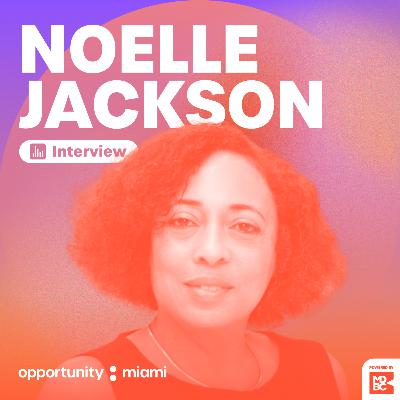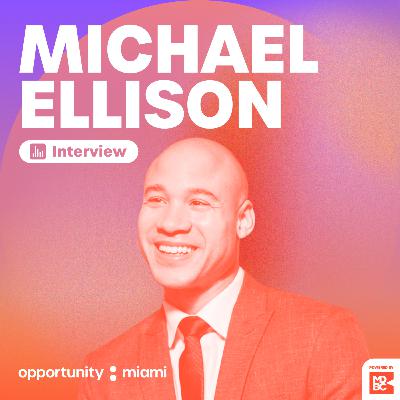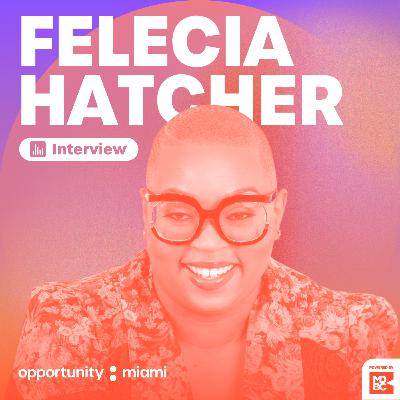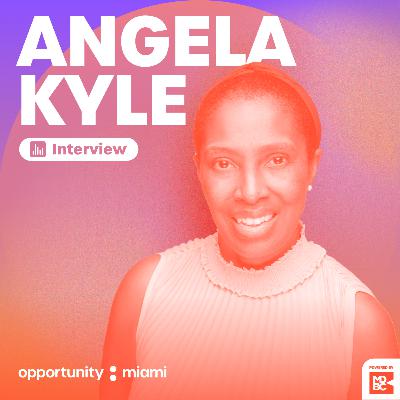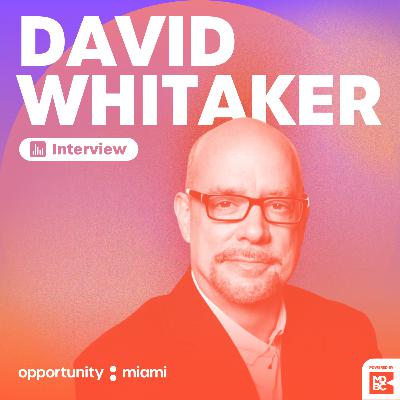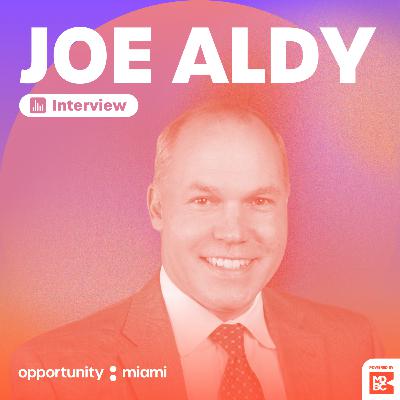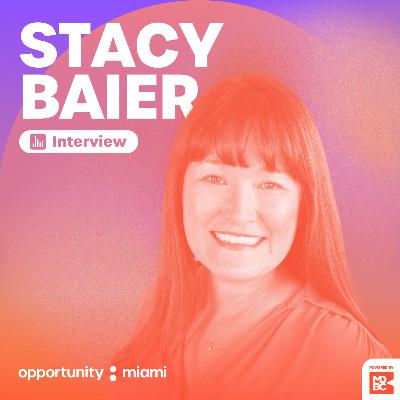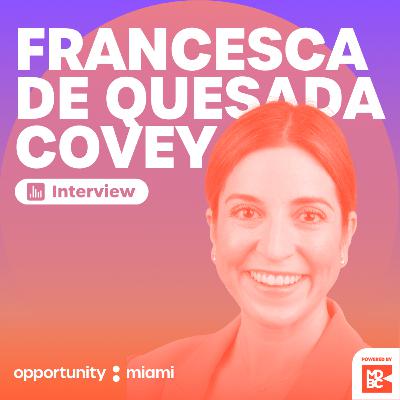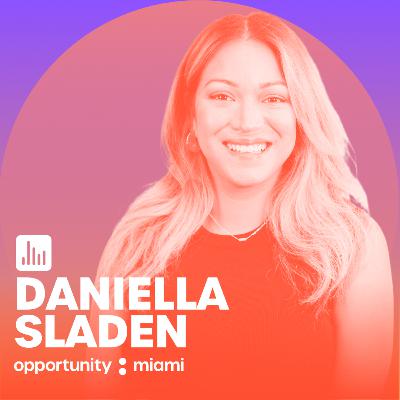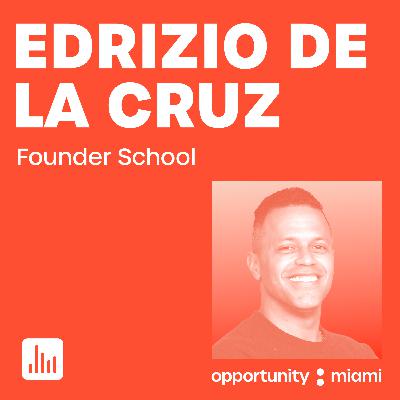Discover Opportunity Miami
Opportunity Miami

Opportunity Miami
Author: Opportunity Miami
Subscribed: 0Played: 9Subscribe
Share
© Opportunity Miami
Description
This is a pivotal moment for Miami, which has never been positioned so strongly for success -- or faced such daunting challenges, from sea-level rise to income inequality. On Opportunity Miami, host Matt Haggman talks to the innovators, entrepreneurs, and community champions who are turning the community’s biggest challenges into its greatest opportunities. Opportunity Miami is powered by the Miami-Dade Beacon Council.
67 Episodes
Reverse
Over the past two years, Juan Carlos (JC) Liscano has served as Chair of The Miami-Dade Beacon Council and Co-Chair of Opportunity Miami. During this time, the Vice President of American Airlines’ Miami hub has demonstrated to us what vision and service can accomplish. “Economic development touches many parts of our community, but the success of Miami is predicated on having a really strong economic development agency. The Beacon Council is exactly that.”American Airlines is the largest private employer in Miami-Dade County, employing over 15,000 people with a payroll impact of nearly $2 billion. “We’ve been a hub at Miami for more than three and a half decades, and we’ve always functioned on the premise that what’s good for Miami is good for American — and not the other way around,” he said. “American Airlines is inextricably linked to this market. I love that we’re Miami’s hometown airline.”
In the heart of Miami, on the fifth floor of the Omni building, something bigger than a coworking space is taking shape. The HUB is not just about “shared internet, shared desk, but more importantly, shared purpose,” says founder and CEO Noelle Jackson. The HUB was created to give startups and small businesses more than a physical address — it was built to give them a home. Jackson, who has spent her life as an entrepreneur, saw both the gaps and the opportunities in Miami’s business ecosystem.
If Miami wants to lead as a global tech hub, it must do more than attract companies—it must create opportunities for talent of today, talent of tomorrow, and talent from all backgrounds. “Talent is everywhere, but opportunity isn’t,” said Michael Ellison, co-founder and CEO of CodePath.org, the nonprofit reshaping computer science education and career pathways for underserved students. For Ellison, the key to Miami’s future lies in embedding access directly where students are—community colleges and state schools—so the next generation of engineers can drive innovation in AI, cybersecurity, fintech, and beyond. “It just is painfully obvious. You need to embed it where people are, and hopefully for free or as low a cost as you possibly can,” he explained.
Imagine thousands of electric vehicles across Miami working together to support our power grid during a hot summer afternoon. That is the near future Casper Rasmussen envisions for the EV charging industry. “All the magic happens on the software side,” said the CEO and co-founder of Monta, a Copenhagen-based EV charging software company that recently made Miami its North American headquarters. Monta’s mission is to make charging as seamless as filling up a gas tank, powered by software that connects drivers, charging stations, and the grid itself.
To transform the entrepreneurial landscape, culture is not only a necessity but an asset.As Felecia Hatcher puts it: “Culture is our capital.”As CEO of Pharrell Williams’ nonprofit, Black Ambition, she aims to reframe how we view success, innovation, and economic opportunity for historically marginalized entrepreneurs. Their most valuable assets: creativity, influence, resilience, and community.“I don’t think there’s an area of culture, community or even continents that hasn’t been influenced by diverse entrepreneurs. The opportunity is to turn that influence into ownership and wealth,” she said.
In Miami, we’re always chasing what’s next. What was once a tourist destination is now a rising global finance, technology, and real estate hub. But with opportunity comes responsibility. Miami’s changing landscape is redefining how we grow, and real estate sits at the center, uniquely positioned to lead with vision, adaptability, and long-term impact. "Sustainability is really impacting the real estate industry,” said Angela Kyle, Vice President of Client Sustainability Partnerships for JLL, one of the world’s largest real estate services firms. Learn how unlocking climate capital in Miami’s real estate market can lead to a low-carbon future.
We believe talent drives everything. Entrepreneurship builds community wealth. And sustainability isn’t optional—it’s expected. These priorities guide our work across industries and institutions.But one of Miami’s most surprising superpowers? Tourism.In a region where quality of life and business opportunities converge, tourism is more than a side story. Listen or watch here to learn how tourism aligns with the three pillars of Opportunity Miami: sustainability, talent, and entrepreneurship.
“We have no Plan B because there is no Planet B.” — Ban Ki-moonIt’s more than a slogan. It’s a mandate. And in Miami, that call is being answered—not through top-down declarations, but through local action, trust, and collaboration. “You are not waiting for somebody to come and tell you to get moving. You are already moving, in your own way,” said Kate Landon, Executive Director of the Ban Ki-moon Foundation, of how Miami is showing the world how to align economic growth with justice, sustainability, and inclusion. “What you're doing has tremendous implications, not just for South Florida, but for the entirety of the U.S.”
On a quiet Sunday morning in Biscayne Bay, Dave Doebler set out alone in his kayak, as he often did. But this time, his mission wasn’t just to paddle. He had started to notice something that didn’t belong—trash. And not just a few bottles or bags.What began as a personal ritual evolved into something much larger: a grassroots movement built around action, awareness, and community.Doebler co-founded VolunteerCleanup.org to connect people to local cleanups and inspire them to protect their backyards.“We are building a grassroots movement around people coming out and leading and joining cleanups,” he explains.
We’re on the front lines of climate change here in Miami, where startups and entrepreneurs are testing innovative ways to manage evolving risks.So how can we approach climate risk more creatively and strategically?One approach: think like an economist.“You’re on the forefront. Let’s experiment and scale what works,” said Joseph Aldy, an economist and Harvard Kennedy School professor specializing in environmental policy.
Education is a powerful engine for Miami’s economic growth. When students enroll and graduate, the benefits extend beyond individual success—strengthening businesses, fueling job creation, and boosting local tax revenue. The Florida Future Billions Report, released by Helios Education Foundation, highlights just how transformative this impact can be."If we just looked at increasing college completion by itself and we increased it by 10%, we would see almost $8 billion annually to the state in terms of additional tax revenue, societal benefits that could be used for some of the other investments we need to be making across the state of Florida to make our state stronger," says Stacy Baier, SVP at Helios Education Foundation.For Miami-Dade, this means $2.4 billion in additional revenue—money that could be reinvested into infrastructure, business innovation, and workforce development.
Facing a monumental challenge, Miami-Dade County is redefining what it means to manage waste. Each year, the County generates nearly five million tons of waste—a staggering figure amplified by the county’s three million residents and millions more annual tourists. Each person contributes ten pounds of waste daily, exceeding the national average. With landfills nearing capacity and consumption habits persisting, the need for innovative solutions has never been more urgent. "Waste management is not about trash—it’s about rewriting the story of how we value resources, unlocking economic potential, and building a legacy of sustainability that will empower future generations,”said Dr. Aneisha Daniel, Director of the Miami-Dade County Department of Solid Waste Management (DSWM).
Kandji, an Apple device management and security platform, had its pick of locations for an East Coast headquarters. It could have chosen New York, but instead, it chose Miami. Why? Because Miami is not just growing—it is redefining what it means to be a city of opportunity."Ten years ago, Apple was not the dominant enterprise device—it is today," Kandji Chief Marketing Officer Sylvia LePoidevin said.That shift mirrors Miami’s own rapid transformation from an emerging startup scene to a full-fledged center for global innovation. Kandji saw this momentum and seized the opportunity, launching a 30,000-square-foot headquarters in Coral Gables. "We really see Miami as a new frontier for development, innovation, and technology," LePoidevin explained.
Francesca de Quesada Covey is Miami-Dade County’s Chief of Innovation and Economic Development Officer. As a daughter of Cuban immigrants, she was driven by a relentless desire to create opportunities and solve complex challenges. Reflecting on her journey in our latest Opportunity Miami Interview, she candidly admitted, “I never thought that I would work in local government,” but she does because of the leadership and vision of Mayor Daniella Levine Cava.
Miami is redefining itself as a global innovation hub, attracting top talent, groundbreaking startups, and visionary investors. From record-breaking venture capital to a booming startup ecosystem, Miami’s tech scene is skyrocketing at an unprecedented pace.One of the driving forces behind this remarkable transformation is Melissa Medina, Co-Founder, CEO, and President of eMerge Americas. Her vision and tireless commitment have propelled Miami onto the global tech stage, making it a destination where innovation thrives and bold ideas take flight.
By investing in apprenticeships, digital learning, and sustainability-driven industries, Miami is positioning itself as a model for economic growth and innovation. At the forefront of this transformation are GoSprout and Miami EdTech. “Miami has all the right stakeholders at the table. When we come together, good ideas happen—and that’s the beauty of this city,” says Carlos Vazquez, founder of GoSprout, a digital infrastructure platform revolutionizing workforce training.
Zulu Pods is an aerospace startup redefining jet engine technology and paving the way for a more sustainable future. Co-founded by Latina aerospace engineer Daniella Sladen, Zulu Pods is revolutionizing the aviation industry with innovative solutions that are cost-effective, sustainable, and transformative. “Traditional systems rely on gallons of oil, but our pods reduce that to milliliters,” Sladen explained. “This not only saves weight and cost but also improves performance. For applications like military helicopters, our pods provide the critical last burst of lubrication to safely land in emergencies.”
Buses, cars, planes, and trains account for more than half of greenhouse gas emissions in Miami-Dade County, compared to nearly 30% nationally. So how we get around will play a major role in shaping a cleaner and more sustainable future. Going fully electric can only tackle a part of the problem. Whether driving an electric vehicle or using a drone to deliver a product, the battery that powers it needs to outpower and outrange plain old gasoline. Enter Miami-based startup Ouros Energy. “The main issue is that [the batteries] just don’t store enough energy,” explains Ouros founder Ethan Loosbrock. He’s hoping to “close that gap and enable some of these transportation technologies to transition to batteries.”
Miami embodies the American dream. It’s where the spirit of entrepreneurship is woven into the fabric of our daily lives. Edrizio De La Cruz’s journey—from selling guavas on the streets to selling his fintech company to Mastercard—captures the essence of that dream. Now, through The Founder School, he’s empowering underrepresented entrepreneurs to follow in his footsteps. "I want to give others the opportunity to succeed, especially people who don’t typically have access to the tools or funding they need," De La Cruz said. This kind of leadership is essential to growing Miami’s entrepreneurial ecosystem.
The Miami of 2040 can be more innovative and inclusive. Tech Equity Miami is helping to close the tech disparity gap in the community. Led by Johanna Mikkola, Tech Equity Miami is a nonprofit funding consortium launched two years ago to serve as the bridge between funders and initiatives to build a strong tech ecosystem in Miami. They are deploying $100 million over five years to initiatives that remove entry barriers into the tech industry and expand economic opportunities for underrepresented groups, including youth and small businesses, in the area. “Equity and inclusion is really important because we are an ecosystem of immigrants,” noted Mikkola, who is originally from Finland and moved to Miami from Canada. “We need to make sure that there’s representation in the tech ecosystem so that kids are inspired and see it as a genuine pathway.”



